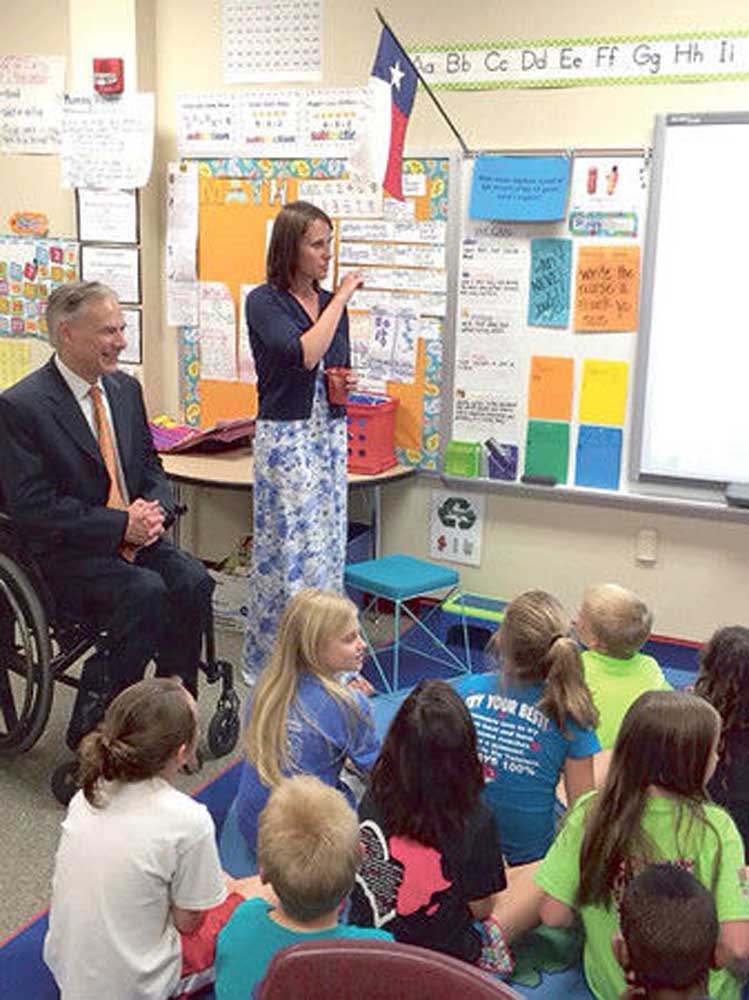Greg Abbott unveils third phase of his education plan in Tyler
Published 8:06 pm Thursday, May 8, 2014

- Gubernatorial candidate Greg Abbott toured Jack Elementary School on Thursday, where he unveiled the third phase of his plan to improve Texas public education over the next decade. (Courtesy)
Republican gubernatorial candidate Greg Abbott said digital technology is the future for Texas’ classrooms.
Abbott unveiled the third phase of his public education plan during a Thursday tour of Jack Elementary School in Tyler, and its digital teaching tools, including “SMART boards,” which help student-teacher interaction and response. He announced a $164 million plan to increase accessibility to technological teaching tools, online courses, teacher and student tutoring modules and state grants to improve digital learning.
The first two phases of Abbott’s four-pronged public education plan included focusing on kindergarten to third-graders and producing “grade level,” students in math and reading. The second includes returning “genuine local control,” such as allowing school boards, superintendents and principals exemptions from state mandates.
“Texas is No. 1 in creating jobs, energy, exports and so many different things,” Abbott said. “My goal is a new No. 1 ranking — public education.”
Abbott said preparing students for tomorrow’s jobs now is the only way to maintain Texas’ growth and prosperity.
Digital learning tools will help students keep pace and accelerate learning, he said. He said high school students should have more learning options, from trade skills, and online courses. Students in poor-performing schools should have choices and access to learning tools and the best teachers regardless of what campus they are enrolled, he said.
Digital learning would aid and augment rather than substitute for teachers in the classroom, he said.
Abbott said his plan would provide $250,000 to $650,000 competitive grants to reward excelling districts and better equip poor performing schools.
Sen. Kevin Eltife, R-Tyler, said he was happy public education has become Abbott’s No. 1 gubernatorial platform.
“Nothing is more important to our economy and our future,” he said. “For Greg Abbott to make it the centerpiece of his governorship is an important statement.”
Abbott, the state’s attorney general, will face Democratic state Sen. Wendy Davis for governor in November.
Sen. Davis’ campaign responded by condemning Abbott’s fight against a lawsuit levied to restore more than $5 billion in funding cuts by 600 school districts across Texas, including TISD.
“Greg Abbott has clearly loss count of the school districts he’s fighting in court as he’s showing up at yet another school that he is defending teacher layoffs, crowded classrooms and closed public schools,” Zac Petkanas, Sen. Davis’ campaign communication director, said.
Petkanas said Abbott can’t hide from failed efforts when it comes to educating students. He said Abbott’s plan “chooses which kids and which schools are winners and which ones are losers.”
Smith County Democratic Party Chairman David Henderson, who arrived at Jack Elementary School and was turned away because the meeting was not “open to the public,” said Abbott represents the GOP establishment’s policy that put teachers, public education and the state’s future workforce on the chopping block during the 2011 legislative session.
“You can’t have a 21 Century education system when you cut $5 billion out and then not restore it when you can afford to,” Henderson said.
Henderson said Abbott is regurgitating a political myth about education and technology. There is no technological substitute for a good teacher and classroom-based learning processes, he said.
Abbott said the state must stop teaching using methods five decades old. He said new technology will give students access to better teachers, better classroom experiences, better learning arcs for individuals and better prepare students for the workforce or university.
There also may be opportunity for public-private partnerships between districts and industry to provide educational opportunities, he added.
The $164 million price tag, which Abbott said is in the current two-year budget, surprised Eltife and state Reps. Bryan Hughes, R-Mineola, and David Simpson, R-Longview, who viewed the cost as a “drop in the (budget) bucket.”
Abbott said technology would end the decades-old “one-size-fits-all” education system.
“We want to leverage technology today and prepare for the future so Texans are at the forefront of technology tomorrow,” he said.







